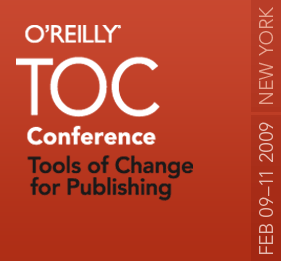 I “attended” my first Tools of Change (TOC) conference in 2009 via Twitter, and it wouldn’t be exaggerating much to say it was a turning point in my career.
I “attended” my first Tools of Change (TOC) conference in 2009 via Twitter, and it wouldn’t be exaggerating much to say it was a turning point in my career.
Prior to that week, I’d recently been promoted to Publisher & Editorial Director for Horticulture (after a significant reorganization that brought F+W Media’s Books and Magazines units together under single-branded communities); passive-aggressively blogging my thoughts and frustrations about the industry here; and struggling to find anyone on the magazine side using Twitter in an interesting way.
That week, Twitter arguably became the most significant personal tool of change in my career since I taught myself QuickFill back in ’93 and pushed my way out of a temp position into my first full-time job in publishing as a Circulation Assistant. While I was unable to find many people on the magazine side using the fledgling new shiny, book people were all over it and loving it. One follow led to another led to a hashtag led to conversations led to my “attending” TOC virtually, and the experience was so immersive, to this day, some people swear we met there in person that year.
I wrote two blog posts that week based on the conference (“Building Communities Around Content” and “Three Tips for Curating the Community“), and quickly discovered the magic of Twitter as a traffic driver when the first was retweeted by @TOC itself. More importantly, though, I connected with dozens of people I’d have never met otherwise, quite a few of whom would go on to play critical roles in what happened to me over the next 11 months, as I would end up becoming the “Chief Executive Optimist” of F+W’s newest community, and TOC’s newest competitor, Digital Book World:
With a two-day event, though, time is limited.
Fortunately, there are 363 more days in the year to work with.
The publishing community is large, diverse, and extremely passionate, and coming out of this conference, I’m excited to announce that, not only will we be gathering back at the Sheraton New York next year (January 25-26, 2011), we will also be producing a number of events, online and in-person, that focus on implementing the strategies that were put forward at the conference.
From digital workflow to marketing tactics to career resources, Digital Book World will offer programming that addresses the needs of the entire publishing community, from publishers and agents, to booksellers, librarians and authors.
People are reading more than ever, and that’s not a threat to publishers, it’s an opportunity.
Since then, TOC evolved, its tone becoming less antagonistic, more practical and cognizant of the diversity of the industry that makes the digital shift more challenging for some than others. DBW, too, has evolved, as has the publishing industry itself.
Yesterday’s announcement that O’Reilly is retiring TOC came as a bit of a surprise at first, but in retrospect, it makes sense. Its focus on tools was a strength in the early days of the digital transition, but as the new shiny wore off, self-proclaimed “disruptors” faded away quietly, and viable business models came to light, it became clear that the tools of change that counted most were the people in the trenches, not the provocative pundits with plenty of ideas and little or no skin in the game.
One could argue that they could have pivoted (and I’d argue that they actually did over the past three years), but Tim O’Reilly’s purposeful reference to TOC’s origination suggests he believes it has accomplished its mission and there’s no reason to linger: “Our goal is to bring together people who are pushing the boundaries of publishing and those who want to learn from them, and to provide a table of contents (TOC), so to speak, on what modern publishers need to know.”
UPDATE: Tim O’Reilly elaborated a bit more on Twitter, in a conversation with LibraryThing’s Tim Spalding.
“What I said, plus opportunity cost. Expensive in NY, not very profitable; not enough resource to do everything we want.” [link]
“But I’m also very deeply involved in the ebook stuff at O’Reilly. TOC shutdown is a shift of resources, not of interest” [link]
TOC did what it set out to do, and, credit where due, it did a damn good job.
Conferences come and go, but smart people will always find ways to connect, share resources, and move forward.
Kudos and best wishes to everyone involved in putting the Tools of Change conference and related resources together over the years, particularly those I had the pleasure of working with directly (and, at times, competing against): Kat Meyer, Jenn Webb and Sharon Cordesse.
Do you like email?
Sign up here to get my bi-weekly "newsletter" and/or receive every new blog post delivered right to your inbox. (Burner emails are fine. I get it!)

